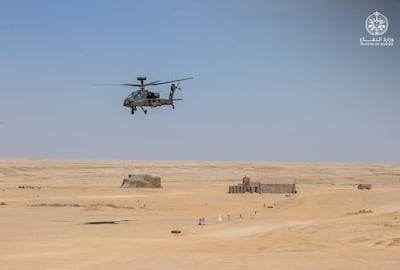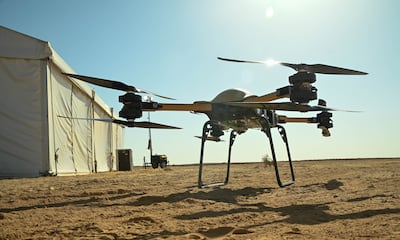US and Saudi forces have led the Middle East’s largest live-fire counter-drone military exercise.
The drills were aimed at “improving the detection, tracking and elimination of modern drone threats”, the US Central Command said on Wednesday.
Admiral Brad Cooper, on his first visit to the region as Centcom commander, joined Saudi armed forces chief of staff Gen Fayyadh Al Ruwaili at the Red Sands Integrated Experimentation Centre in the north-east of the kingdom for the event.
The drills started on September 7 and featured more than 300 personnel and 20 counter-drone systems.
“Red Sands brought together US, Saudi and industry capabilities and expertise to identify ‘best in breed’ systems for detecting, tracking and eliminating modern aerial drone threats,” said Admiral Cooper.

The military exercises come at a time of heightened regional tension after Israel attacked senior Hamas leaders in Doha last week. Washington, a close ally of Qatar and the Gulf, has been walking a thin line in balancing its relations with Israel.
Centcom said that Iran and its proxies have launched thousands of one-way attack drones and missiles in recent years, killing and injuring civilians while also disrupting maritime traffic and destabilising the Middle East.
“Threats posed by the proliferation of advanced drones are a pressing challenge,” said Admiral Cooper.
“Working shoulder-to-shoulder with regional partners to innovate and adapt is more critical than ever.”

This year marked the fourth round of joint US-Saudi military exercises, building on progress made since the first experimental demonstration in 2023.
During the drills, US and Saudi forces used advanced technology – including the Signal Hunter, a wearable device that tracks radio signals, and the BPADS acoustic detection system – to quickly identify simulated air threats.
The event also featured integrated command and control systems and Vanguard, a system for eliminating drone swarms.
The Red Sands centre aims to test and improve technology, tactics and procedures aimed at countering emerging threats from drones.
Centcom said the initiative offered regional partners a platform to collaborate, exchange ideas, develop technology and strengthen interoperability.

